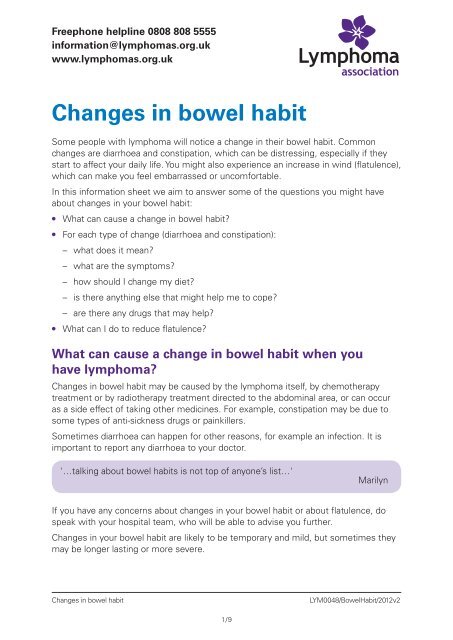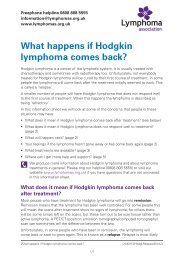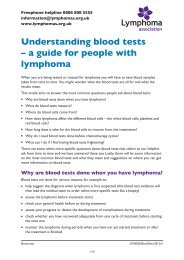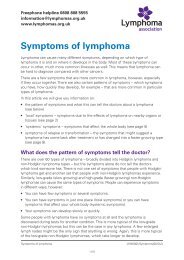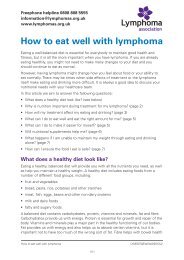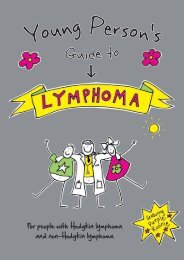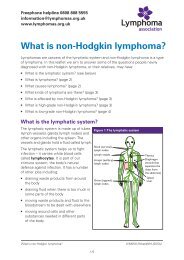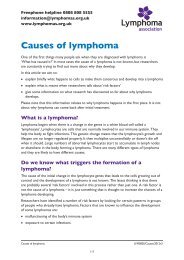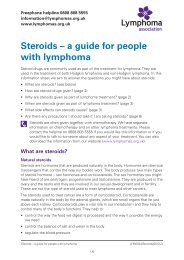"Changes in bowel habit" PDF - Lymphoma Association
"Changes in bowel habit" PDF - Lymphoma Association
"Changes in bowel habit" PDF - Lymphoma Association
You also want an ePaper? Increase the reach of your titles
YUMPU automatically turns print PDFs into web optimized ePapers that Google loves.
Freephone helpl<strong>in</strong>e 0808 808 5555<br />
<strong>in</strong>formation@lymphomas.org.uk<br />
www.lymphomas.org.uk<br />
<strong>Changes</strong> <strong>in</strong> <strong>bowel</strong> habit<br />
Some people with lymphoma will notice a change <strong>in</strong> their <strong>bowel</strong> habit. Common<br />
changes are diarrhoea and constipation, which can be distress<strong>in</strong>g, especially if they<br />
start to affect your daily life. You might also experience an <strong>in</strong>crease <strong>in</strong> w<strong>in</strong>d (flatulence),<br />
which can make you feel embarrassed or uncomfortable.<br />
In this <strong>in</strong>formation sheet we aim to answer some of the questions you might have<br />
about changes <strong>in</strong> your <strong>bowel</strong> habit:<br />
● What can cause a change <strong>in</strong> <strong>bowel</strong> habit?<br />
● For each type of change (diarrhoea and constipation):<br />
– what does it mean?<br />
– what are the symptoms?<br />
– how should I change my diet?<br />
– is there anyth<strong>in</strong>g else that might help me to cope?<br />
– are there any drugs that may help?<br />
● What can I do to reduce flatulence?<br />
What can cause a change <strong>in</strong> <strong>bowel</strong> habit when you<br />
have lymphoma?<br />
<strong>Changes</strong> <strong>in</strong> <strong>bowel</strong> habit may be caused by the lymphoma itself, by chemotherapy<br />
treatment or by radiotherapy treatment directed to the abdom<strong>in</strong>al area, or can occur<br />
as a side effect of tak<strong>in</strong>g other medic<strong>in</strong>es. For example, constipation may be due to<br />
some types of anti-sickness drugs or pa<strong>in</strong>killers.<br />
Sometimes diarrhoea can happen for other reasons, for example an <strong>in</strong>fection. It is<br />
important to report any diarrhoea to your doctor.<br />
'…talk<strong>in</strong>g about <strong>bowel</strong> habits is not top of anyone’s list…'<br />
Marilyn<br />
If you have any concerns about changes <strong>in</strong> your <strong>bowel</strong> habit or about flatulence, do<br />
speak with your hospital team, who will be able to advise you further.<br />
<strong>Changes</strong> <strong>in</strong> your <strong>bowel</strong> habit are likely to be temporary and mild, but sometimes they<br />
may be longer last<strong>in</strong>g or more severe.<br />
<strong>Changes</strong> <strong>in</strong> <strong>bowel</strong> habit<br />
LYM0048/BowelHabit/2012v2<br />
1/9
‘The changes <strong>in</strong> <strong>bowel</strong> habit (constipation) I have experienced have greatly affected<br />
my life and even now, 3 years after complet<strong>in</strong>g treatment, I have problems.<br />
It is difficult to get my GP to accept this is an ongo<strong>in</strong>g problem that may not<br />
necessarily be helped by the usual methods of extra fibre, etc’.<br />
Jill<br />
Diarrhoea<br />
Normal <strong>bowel</strong> habits vary. You may be someone who goes more than once a day or<br />
someone who goes once every 3 days. Know<strong>in</strong>g what is normal for you is important<br />
when decid<strong>in</strong>g if you have diarrhoea. If you have diarrhoea your doctor will ask you to<br />
provide a sample for test<strong>in</strong>g to f<strong>in</strong>d out if this has been caused by an <strong>in</strong>fection.<br />
What is meant by diarrhoea?<br />
Generally, diarrhoea means one or all of the follow<strong>in</strong>g:<br />
● an <strong>in</strong>crease <strong>in</strong> the number of <strong>bowel</strong> movements you have each day<br />
● an <strong>in</strong>crease <strong>in</strong> the amount (volume) of stools you pass <strong>in</strong> a day<br />
● a change <strong>in</strong> the way your stools look – stools may be less firm and more watery.<br />
What are the symptoms?<br />
Possible symptoms of diarrhoea <strong>in</strong>clude:<br />
● cramp<strong>in</strong>g pa<strong>in</strong>s <strong>in</strong> the abdomen (tummy)<br />
● feel<strong>in</strong>g nauseous (feel<strong>in</strong>g sick)<br />
● need<strong>in</strong>g to get to the toilet urgently<br />
● a bloated feel<strong>in</strong>g <strong>in</strong> the abdomen<br />
● feel<strong>in</strong>g feverish<br />
● a change <strong>in</strong> your usual <strong>bowel</strong> movements.<br />
Cop<strong>in</strong>g with diarrhoea<br />
If you experience diarrhoea, you may f<strong>in</strong>d the suggestions below helpful.<br />
<strong>Changes</strong> to your diet<br />
If your diarrhoea is caused by radiotherapy to your abdomen, mak<strong>in</strong>g dietary changes<br />
is unlikely to help. Always discuss your concerns with your radiotherapist (cl<strong>in</strong>ical<br />
oncologist) or another member of your medical team before chang<strong>in</strong>g your diet.<br />
Possible suggestions <strong>in</strong>clude:<br />
● Dr<strong>in</strong>k extra fluids dur<strong>in</strong>g the day to help replace the fluids lost by diarrhoea.<br />
● Some dr<strong>in</strong>ks can stimulate the <strong>bowel</strong> and make diarrhoea worse. These <strong>in</strong>clude<br />
fruit juices (such as orange juice), tea, coffee, milk and alcohol. Dr<strong>in</strong>k<strong>in</strong>g pla<strong>in</strong> water<br />
can help.<br />
<strong>Changes</strong> <strong>in</strong> <strong>bowel</strong> habit<br />
LYM0048/BowelHabit/2012v2<br />
2/9
● Dr<strong>in</strong>ks that are particularly hot or cold can stimulate the <strong>bowel</strong>. Try tak<strong>in</strong>g dr<strong>in</strong>ks<br />
when they have cooled a little, which will make them more tolerable.<br />
● Smok<strong>in</strong>g can also stimulate the <strong>bowel</strong> and is best avoided.<br />
● Try eat<strong>in</strong>g five smaller meals a day.<br />
● Foods that are high <strong>in</strong> fibre, such as raw fruit and vegetables, beans, nuts or<br />
wholegra<strong>in</strong> cereals can make diarrhoea worse. Fatty, greasy or spicy foods, <strong>in</strong>clud<strong>in</strong>g<br />
milk products may also cause this. Eat<strong>in</strong>g vegetables without their sk<strong>in</strong> will make<br />
them lower <strong>in</strong> fibre. Low-fibre foods <strong>in</strong>clude mashed potato, white rice, dry white<br />
toast and bananas.<br />
●<br />
Dur<strong>in</strong>g episodes of diarrhoea the body can become low <strong>in</strong> an important m<strong>in</strong>eral<br />
called potassium. You might like to <strong>in</strong>clude bananas <strong>in</strong> your diet as they are a good<br />
source of potassium and lower <strong>in</strong> fibre than some other fruits. Other sources of<br />
potassium <strong>in</strong>clude potatoes, fish, bread, chicken, beef and turkey.<br />
Look<strong>in</strong>g after your sk<strong>in</strong><br />
Diarrhoea can cause the sk<strong>in</strong> around your anus to become sore. The follow<strong>in</strong>g tips<br />
might help:<br />
●<br />
●<br />
●<br />
●<br />
●<br />
Us<strong>in</strong>g toilet paper can be pa<strong>in</strong>ful. Try us<strong>in</strong>g unscented toilet wipes <strong>in</strong>stead. (Note: Most<br />
baby wipes are not flushable, but you can buy toilet wipes which can be flushed away.)<br />
Hav<strong>in</strong>g a warm bath can help soothe pa<strong>in</strong> and tenderness.<br />
Pat the area dry with a soft towel after a bath or shower. Try not to rub.<br />
Ask your medical team about sooth<strong>in</strong>g creams to apply. Your radiotherapy team will<br />
advise you about creams if you are hav<strong>in</strong>g radiotherapy.<br />
To avoid additional irritation, avoid wear<strong>in</strong>g tight or nylon underwear, tight trousers<br />
and jeans.<br />
Cop<strong>in</strong>g when you are out and about<br />
Be<strong>in</strong>g away from familiar surround<strong>in</strong>gs can be stressful and worry<strong>in</strong>g if you have<br />
diarrhoea. The follow<strong>in</strong>g suggestions may help you feel more confident and prepared<br />
when you are out and about:<br />
● Try to avoid long tra<strong>in</strong>, bus and car journeys.<br />
● Before you travel, try to plan ahead and know where you will be able to f<strong>in</strong>d toilets.<br />
●<br />
Carry a ‘Just can’t wait’ card when you are out and about and worry<strong>in</strong>g about access<br />
to toilets (for example the card produced by the Bladder and Bowel Foundation, see<br />
page 8 for their contact details).<br />
● Always have some spare clothes with you. Carry<strong>in</strong>g a plastic bag is also helpful for<br />
soiled clothes.<br />
● You may feel more confident wear<strong>in</strong>g a pad to protect your underwear.<br />
● If you are worried about nasty smells, take a body spray or perfume with you to help<br />
you to feel fresh.<br />
<strong>Changes</strong> <strong>in</strong> <strong>bowel</strong> habit<br />
LYM0048/BowelHabit/2012v2<br />
3/9
Cop<strong>in</strong>g at home<br />
You will probably feel more confident and comfortable at home, but there are still<br />
th<strong>in</strong>gs you can do to make life easier:<br />
● You may feel extremely tired when hav<strong>in</strong>g diarrhoea. Your body loses a lot of fluid,<br />
which will naturally make you feel weak. It is important to keep dr<strong>in</strong>k<strong>in</strong>g to replace<br />
the fluids you have lost to avoid dehydration.<br />
● Remember to rest as much as you can. This is not always possible but ask<strong>in</strong>g family<br />
or friends to help with chores might help you to recover more quickly.<br />
● You may f<strong>in</strong>d the use of a bidet, if you have one, to be helpful.<br />
● Protect your bed if you are worried about hav<strong>in</strong>g an accident dur<strong>in</strong>g the night.<br />
Disposable waterproof bed pads are available from most supermarkets. You could<br />
ask at your hospital for a supply (not all hospitals will be able to offer this).<br />
● You may feel more confident with a commode by your bed, particularly if you are<br />
unable to get to the toilet quickly. Ask your medical team if they can arrange to<br />
provide a commode for you.<br />
● If you often have accidents, speak with your medical team. They may be able to<br />
change your medic<strong>in</strong>es or perhaps give you antidiarrhoeal drugs.<br />
Always keep your medical team <strong>in</strong>formed. If you have had diarrhoea you need to<br />
tell your doctor as you may have an <strong>in</strong>fection which needs further <strong>in</strong>vestigation.<br />
Drugs that can be prescribed by your doctor<br />
The drugs used to help manage diarrhoea are generally divided <strong>in</strong>to two groups:<br />
● Anti-motility medic<strong>in</strong>es help to reduce the number of <strong>bowel</strong> movements so you will<br />
need to go to the toilet less often. An example is loperamide (Imodium ® ).<br />
● Bulk-form<strong>in</strong>g agents make the stools more solid. An example is methylcellulose<br />
(Celevac ® ).<br />
In addition, you may be prescribed a m<strong>in</strong>eral powder that dissolves <strong>in</strong> water to help<br />
rehydrate your body.<br />
Constipation<br />
As mentioned <strong>in</strong> the previous section about diarrhoea, know<strong>in</strong>g what is normal for you<br />
is important. If you are worried about becom<strong>in</strong>g constipated, discuss this with your<br />
medical team.<br />
Constipation can occur for a number of reasons. It can be caused by:<br />
● some chemotherapy drugs<br />
● the anti-sickness drugs often used with chemotherapy treatments<br />
● pa<strong>in</strong>kill<strong>in</strong>g drugs, especially those which are morph<strong>in</strong>e-based.<br />
<strong>Changes</strong> <strong>in</strong> <strong>bowel</strong> habit<br />
LYM0048/BowelHabit/2012v2<br />
4/9
Constipation can also be worsened by:<br />
● anxiety and depression<br />
● be<strong>in</strong>g unable to eat or dr<strong>in</strong>k normally<br />
● be<strong>in</strong>g less mobile because of feel<strong>in</strong>g weak or unwell.<br />
What is meant by constipation?<br />
Generally, you have constipation if:<br />
● you have difficulty and/or pa<strong>in</strong> when open<strong>in</strong>g your <strong>bowel</strong>s (you may f<strong>in</strong>d you have to<br />
stra<strong>in</strong> a lot to pass a stool)<br />
● your stools are hard and small, and difficult to pass<br />
● you are open<strong>in</strong>g your <strong>bowel</strong>s less often than normal.<br />
What are the symptoms?<br />
Possible symptoms of constipation <strong>in</strong>clude:<br />
● not feel<strong>in</strong>g empty<br />
● feel<strong>in</strong>g bloated and sluggish<br />
● loss of appetite<br />
● a hard swollen stomach<br />
● stomach-ache and cramps<br />
● very liquid diarrhoea that you can’t control – this is called ‘overflow diarrhoea’<br />
● change <strong>in</strong> your usual <strong>bowel</strong> movements<br />
● fatigue<br />
● feel<strong>in</strong>g nauseous<br />
● headaches.<br />
Cop<strong>in</strong>g with constipation<br />
You may be able to prevent or stop constipation by eat<strong>in</strong>g more fibre <strong>in</strong> your diet and<br />
dr<strong>in</strong>k<strong>in</strong>g plenty of fluids. You might get advice from your hospital dietitian to help you<br />
plan a high-fibre diet.<br />
Hav<strong>in</strong>g difficulty pass<strong>in</strong>g stools can make you stra<strong>in</strong> quite hard when you use the<br />
toilet. It is important not to stra<strong>in</strong> <strong>in</strong> order to prevent piles or damage to the delicate<br />
sk<strong>in</strong> around the back passage, which could lead to an <strong>in</strong>fection.<br />
<strong>Changes</strong> to your diet<br />
Possible suggestions <strong>in</strong>clude:<br />
● Dr<strong>in</strong>k plenty of fluids, both hot and cold dr<strong>in</strong>ks. Aim to dr<strong>in</strong>k at least 2 litres a day.<br />
● Fruit juices, such as orange juice and prune juice, can act as laxatives. Some people<br />
f<strong>in</strong>d dr<strong>in</strong>k<strong>in</strong>g coffee can stimulate the <strong>bowel</strong> too.<br />
<strong>Changes</strong> <strong>in</strong> <strong>bowel</strong> habit<br />
LYM0048/BowelHabit/2012v2<br />
5/9
● Try to eat at the same time every day, which may help to make your <strong>bowel</strong> motions<br />
more regular.<br />
● Eat plenty of fibre <strong>in</strong> your diet. Good sources of fibre <strong>in</strong>clude:<br />
– wholewheat breakfast cereals like Weetabix ® , Shredded Wheat ® or muesli<br />
– wholemeal or granary breads<br />
– brown rice and wholemeal pasta<br />
– beans, pulses, lentils and oats.<br />
● Try to eat a variety of fresh fruit and vegetables with their sk<strong>in</strong>s on for added fibre.<br />
● Natural remedies such as figs, apricots, liquorice and prune juice may help.<br />
Keep mov<strong>in</strong>g<br />
● Although side effects from lymphoma and its treatments can make keep<strong>in</strong>g active<br />
more difficult, a little exercise, such as a gentle walk, may help to keep your stools<br />
soft and regular.<br />
● Gentle exercise is also known to <strong>in</strong>crease energy levels.<br />
Drugs that can be prescribed by your doctor<br />
Keep your medical team <strong>in</strong>formed if you have constipation that does not improve,<br />
particularly if you have not opened your <strong>bowel</strong>s for 3 days. Your constipation will be<br />
easier to treat if you let your medical team know about it early on.<br />
Constipation can be treated by:<br />
● laxative drugs given by mouth <strong>in</strong> tablet, liquid or capsule form<br />
● suppositories, which look like pellets and are <strong>in</strong>serted <strong>in</strong>to the rectum (back passage).<br />
If you are currently hav<strong>in</strong>g chemotherapy or if you have a low white blood cell count<br />
check with your doctor before us<strong>in</strong>g suppositories<br />
● an enema, which is a liquid that is <strong>in</strong>serted <strong>in</strong>to the rectum.<br />
There are four groups of laxatives, which act <strong>in</strong> different ways:<br />
● laxatives that <strong>in</strong>crease the amount of fluid <strong>in</strong> the <strong>bowel</strong> and make stools softer and<br />
easier to pass – an example of this type is lactulose (Duphalac ® , Lactugal ® )<br />
● laxatives that change the content of the stool to trigger the <strong>bowel</strong> to move – an<br />
example is methylcellulose (Celevac ® ), which can also be used to treat diarrhoea<br />
● laxatives that soften the stools and make them easier to pass – an example of this<br />
type is docusate sodium (Dioctyl ® , Docusol ® )<br />
● laxatives that cause the <strong>bowel</strong> to move more, so push<strong>in</strong>g the stools down the colon<br />
to the rectum ready to be passed – an example of this type is bisacodyl (Dulcolax ® ).<br />
<strong>Changes</strong> <strong>in</strong> <strong>bowel</strong> habit<br />
LYM0048/BowelHabit/2012v2<br />
6/9
Flatulence (pass<strong>in</strong>g w<strong>in</strong>d)<br />
Some people experience more flatulence dur<strong>in</strong>g treatment. This is due to more gas<br />
be<strong>in</strong>g created <strong>in</strong> the digestive system, which makes you pass w<strong>in</strong>d more often than<br />
usual. Although not a serious problem, this can be embarrass<strong>in</strong>g or worry<strong>in</strong>g.<br />
What will make flatulence worse?<br />
There are several th<strong>in</strong>gs that can make flatulence worse, <strong>in</strong>clud<strong>in</strong>g:<br />
● eat<strong>in</strong>g large quantities of high-fibre foods<br />
● swallow<strong>in</strong>g too much air while eat<strong>in</strong>g<br />
● dr<strong>in</strong>k<strong>in</strong>g gassy dr<strong>in</strong>ks, <strong>in</strong>clud<strong>in</strong>g beer<br />
● smok<strong>in</strong>g<br />
● be<strong>in</strong>g lactose-<strong>in</strong>tolerant.<br />
What can I do to reduce flatulence?<br />
It is not possible to stop flatulence altogether but there are a few th<strong>in</strong>gs that you can<br />
do to help control it:<br />
● Avoid foods that make it worse, such as cabbage, sprouts, onions, beans and<br />
cauliflower.<br />
● Try to eat your food slowly and chew for longer. This will reduce the amount of air<br />
that you swallow.<br />
● Dr<strong>in</strong>k fluids slowly rather than gulp<strong>in</strong>g.<br />
● You might try eat<strong>in</strong>g g<strong>in</strong>ger, dr<strong>in</strong>k<strong>in</strong>g pepperm<strong>in</strong>t tea (or your GP might prescribe<br />
pepperm<strong>in</strong>t oil capsules), or tak<strong>in</strong>g charcoal tablets, which can absorb smells and<br />
are available from most chemists.<br />
● Try tak<strong>in</strong>g gentle exercise, especially walk<strong>in</strong>g, which may br<strong>in</strong>g some relief.<br />
If you have any concerns speak with your medical team, who will be able to advise<br />
you further.<br />
If you have another <strong>bowel</strong> condition<br />
If you already have another <strong>bowel</strong> condition such as Crohn’s disease, ulcerative colitis<br />
or you have haemorrhoids or an anal fissure you should contact your medical team for<br />
advice before try<strong>in</strong>g to treat constipation or diarrhoea yourself.<br />
Acknowledgements<br />
We are grateful to Teresa Groom and Veronica Lewis, Haematology Cl<strong>in</strong>ical Nurse<br />
Specialists at West Suffolk Hospital <strong>in</strong> Bury St Edmunds, Suffolk for their assistance <strong>in</strong><br />
review<strong>in</strong>g this <strong>in</strong>formation.<br />
<strong>Changes</strong> <strong>in</strong> <strong>bowel</strong> habit<br />
LYM0048/BowelHabit/2012v2<br />
7/9
Useful sources of further <strong>in</strong>formation about changes <strong>in</strong> <strong>bowel</strong> habit<br />
Bladder and Bowel Foundation<br />
SATRA Innovation Park<br />
Rock<strong>in</strong>gham Road<br />
Ketter<strong>in</strong>g<br />
Northamptonshire NN16 9JH<br />
0845 345 0165 (Monday–Friday, office hours, voicemail out of hours)<br />
<strong>in</strong>fo@bladderand<strong>bowel</strong>foundation.org<br />
www.bladderand<strong>bowel</strong>foundation.org<br />
CancerHelp<br />
(part of Cancer Research UK)<br />
0808 800 40 40 (Monday–Friday, 9am–5pm)<br />
via website<br />
http://cancerhelp.cancerresearchuk.org<br />
Macmillan Cancer Support<br />
89 Albert Embankment<br />
London SE1 7UQ<br />
0808 808 00 00 (Monday–Friday, 9am–8pm)<br />
Order l<strong>in</strong>e for booklets 0800 500 800<br />
via website<br />
www.macmillan.org.uk<br />
Patient.co.uk<br />
This website has evidence based <strong>in</strong>formation for patients and health professionals on<br />
a wide variety of medical and health topics.<br />
www.patient.co.uk<br />
References<br />
British National Formulary (BNF) No. 64 (September 2012).<br />
Corner J, Bailey C (eds). Cancer Nurs<strong>in</strong>g: care <strong>in</strong> context. 2nd edition. 2008. Blackwell<br />
Publish<strong>in</strong>g, Oxford.<br />
<strong>Changes</strong> <strong>in</strong> <strong>bowel</strong> habit<br />
LYM0048/BowelHabit/2012v2<br />
8/9
How we can help you<br />
We provide:<br />
● a free helpl<strong>in</strong>e provid<strong>in</strong>g <strong>in</strong>formation and emotional support 0808 808 5555 (9am–6pm<br />
Mondays–Thursdays; 9am–5pm Fridays) or <strong>in</strong>formation@lymphomas.org.uk<br />
● free <strong>in</strong>formation sheets and booklets about lymphoma<br />
● a website with forums and a chatroom – www.lymphomas.org.uk<br />
● the opportunity to be put <strong>in</strong> touch with others affected by lymphoma through our<br />
buddy scheme<br />
● a nationwide network of lymphoma support groups.<br />
How you can help us<br />
We cont<strong>in</strong>ually strive to improve our <strong>in</strong>formation resources for people affected by lymphoma<br />
and we would be <strong>in</strong>terested <strong>in</strong> any feedback you might have on this article. Please visit<br />
www.lymphomas.org.uk/feedback or email publications@lymphomas.org.uk<br />
if you have any comments. Alternatively please phone our helpl<strong>in</strong>e on 0808 808 5555.<br />
We make every effort to ensure that the <strong>in</strong>formation we provide is accurate but it<br />
should not be relied upon to reflect the current state of medical research, which is<br />
constantly chang<strong>in</strong>g. If you are concerned about your health, you should consult<br />
your doctor.<br />
The <strong>Lymphoma</strong> <strong>Association</strong> cannot accept liability for any loss or damage result<strong>in</strong>g<br />
from any <strong>in</strong>accuracy <strong>in</strong> this <strong>in</strong>formation or third party <strong>in</strong>formation such as<br />
<strong>in</strong>formation on websites which we l<strong>in</strong>k to. Please see<br />
our website (www.lymphomas.org.uk) for more<br />
<strong>in</strong>formation about how we produce our <strong>in</strong>formation.<br />
© <strong>Lymphoma</strong> <strong>Association</strong><br />
PO Box 386, Aylesbury, Bucks, HP20 2GA<br />
Registered charity no. 1068395<br />
Produced 21.12.2012<br />
Next revision due 21.12.2014<br />
<strong>Changes</strong> <strong>in</strong> <strong>bowel</strong> habit<br />
LYM0048/BowelHabit/2012v2<br />
9/9


